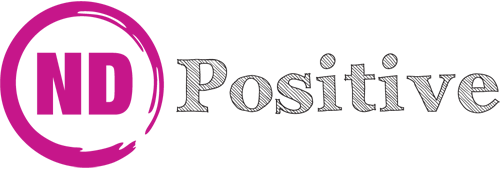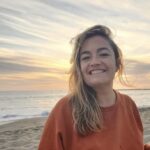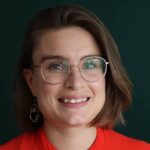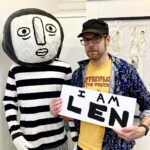
Name: Steve Chapman (aka stevexoh)
ND Type/s: Dyslexia, borderline ASD
What do you do: Artist, writer, speaker
Where do you live: Surrey, UK
How did you start your day today? Do you have a morning routine? What do you have for breakfast, do think a good diet is important?
Today began with the dog waking me up and then snuggling up for a cuddle. I really wanted to get up and get on with things but she was so cuddly and dogs are with us for such a short time so I lay in bed with her for a while and appreciated the experience. Eventually I got up, took her for a walk/me for a coffee then back to the Art Bunker to start doing stuff.
I have more of a routine now that I am travelling less, especially since the lockdowns began. Normally it involves dog walk/coffee (sometimes my wife comes with me), breakfast in the Art Bunker and then getting on with whatever I need to get on with.
I also have a breakfast routine now. For about 2 years now, I have a mix of porridge oats, museli and bran with cold milk and, if we have any, a cut-up banana. For me a good diet is really important, especially as I’m getting older. I’ve been vegetarian for around 14 years now which means that I’ve got used to really thinking about what I eat and checking the ingredients before I do and I’m always conscious about what I might be lacking and what my body is telling me to have more of.
How do you stay active? And what do you do to relax?
I walk a lot. I try to walk everywhere I can. When I go into London my train comes into Waterloo and if I’m going anywhere south of Kings Cross, east of Hyde Park or West of Tower Bridge I will walk. Also, having a dog is a great reason to walk and I take Poppy for a good 10km walk at least 3 or 4 times a week.
I still run but not as much as I used to. I used to run around 30km a week but started to get knee problems so I had to cut back. Nowadays I try to do a minimum of one 10km run per week. If I go more than 7 days without running I feel it starts to affect my mind in that it gets anxious and clogged up.
Relaxing is an interesting thing for me in that I’m not sure I ever do it. At least not while I’m awake as I’m always making something or doing something, constantly mentally or physically active. I guess the time I relax is when I sleep. I’ve always been a good sleeper and I love sleeping. Somebody said to me sleeping is a waste of life, but I disagree. I think habitually watching dull TV is a waste of life – sleeping is a magical part of life. I think because I have such an active mind, I burn up a lot of energy during the day, so sleep is my method of renewal and recovery.
Do you have a favourite word or phrase?
I quite like the word Spong. It’s not in the dictionary but colloquially it means a photoshopped image of a face that has been manipulated to make the main features disproportionately bigger (the opposite of Gnops which is to make the features disproportionately smaller). I just like the sound of the word Spong rather than that definition. I created a fake poster for a music festival called Spongfest and put them all over London and my online outsider art gallery is called The Spongleheim. (www.spongleheim.com). Both of those things were successful, so to me it is a magical word.
Have you read anything good recently? Is there a book that changed your life?
I’m not a very good reader to be honest. I’m a good reader in terms of understanding and processing words but the dyslexic trait that trips me up is my working memory which means I often get a bit lost and end up re-reading things many times. I like reading existential philosophy which is probably the worst thing to read with a poor working memory!
Earlier this year I read “Escape from Freedom” by Erich Fromm which has really influenced my thinking (to be a little more accurate, I read bits of it but listened to the audio book in full). I’m not sure there’s a book that’s changed my life but many like this one that have had an influence on my work.
Which 5 albums would you want to have with you on a desert island?
Oh that’s such a difficult question and I know that the moment I answer this I’ll want to change my mind. But here goes…
1. “Why me? (Live in Berlin)” by Daniel Johnston
2. “Take it from the man” by The Brian Jonestown Massacre
3. “The last time I did acid I went insane” by Jeffrey Lewis
4. “I like it when you smile” by Jad Fair
5. “Keb Darge’s Legendary Deep Funk volume I”
So many I’d miss (sorry Nick Drake and Pavement) but assuming that it’s an emergency and I’ve got to just grab 5, it would be those.
What is the best piece of advice you’ve ever received and who was it from?
Hmm. Another difficult one. Maybe Keith Johnstone, the theatre director who I learnt improv from. He said something like “There are two types of people. Those who say yes and those who say no. Those who say “no” are rewarded with the safety they attain. Those who say “yes” are rewarded with the adventures they have.” I find that a good philosophy for living life.
When you were young, what did you want to be when you were a grown-up? And what was your first Job?
I remember at age 11 wanting to work in radio, draw comics and make music. But by the time I left secondary school I’d learnt that wasn’t a “proper” job and, as I wasn’t any good at the sensible adult subjects, I got a job in a factory packing boxes.
What do you do now and how did you get into it?
I do lots of things that don’t easily fit into a label that conveniently describes it. But the easiest way to explain what I do is to say I’m an artist, writer and speaker interested in creativity and the human condition. How I got into it… well I think it was a gradual letting go of things that I felt I ought to be doing as an adult and gradually reconnecting with that 11 year old kid that used to make radio shows in his bedroom, draw comics and write music. That process of letting go started in my mid 30s and has continued ever since.
Creativity and thinking differently are often credited to neurodiversity. Would you say that is true? And if yes, could you give an example?
For me this is a bit too complicated for a yes or no answer. I think it is dangerously convenient to make a blanket association between the creativity and neurodiversity without really considering what on earth we mean by “creativity”. I was on a panel talking about dyslexia and creativity back in 2020 and one of the audience said “I’m dyslexic but I’m not creative so I feel like a DOUBLE failure.” I found that heart-breaking. This person felt like a double failure not because they’re un-creative but because they were judging themselves by society’s narrow, reductionist definition of what creativity is. The person felt uncreative because they couldn’t make art like the art they had seen in galleries, because they couldn’t sing like the people they had seen sing on TV and that made them feel like a failure. This is the problem of linking the two without really exploring what we mean by creativity.
I think of creativity as our moment-by-moment capacity to realise spontaneous freedom of self. To tune into our here and now “live” experience in such a way that we cannot help but notice more, make connections and improvise with what the world is presenting to us. And whilst this may manifest in what society defines as “creativity” such as making art, it is infinitely broader than that alone.
So, with this broader concept of creativity in mind I can’t help but think that some of the gifts of neuro-diversity better enable those who possess them to move through the world in a more creative way. Talking personally, I think my dyslexia allows me to see patterns that aren’t obvious to others, to connect things that aren’t overtly connected and an ability to perceive and explore tangents. I said in an interview recently that dyslexia sort of predisposes us to live life in a more artful way as we naturally experience the world as a bit wonky. Similarly, I think the ASD traits that I have mean that I am brilliant at noticing things, noticing detail and detail within detail and, at the same time having an incredibly broad peripheral awareness. Combine all of those together with a vivid imagination and it explains why I don’t have to go searching for ideas (see below for the downsides to all of this).
So, to get back to your original question, yes – I think if we are talking about this broader concept of creativity then I think that the various neurodiverse super-powers can be a gift.
When you feel overwhelmed or unfocused, or have lost your focus, what do you do to get back on track? Do you have any hacks, tips or do you use any apps to keep you on track during the day?
I like the Buddhist idea of moving towards that which we would rather avoid and I try to practice this. If I am feeling anxious I try to be curious about my anxiety rather than run away from it. If I am feeling stuck, I try to be curious about my stuckness rather than try to overcome it. And I’ll typically do this through art. I will start to make marks on paper in response to my experience of anxiety. Or I will start to draw stuckness. (I use anxiety and stuckness as examples but the same for anything I might be struggling with). And through responding to it in this way it helps me develop a better understanding of what’s going on for me that, even if It doesn’t dissipate what I am feeling, helps me be more ok with not being ok. And more often than not it will end up as a piece of art, which is why I often say that creating is my therapy. It is often bits of art that have originated in this way that other people love because they can see something of themselves in it.
In the 1:1 work I do with people I encourage them to do the same. You’re feeling un-creative – draw feeling uncreative. You’re in the grip of your inner critic – make a plasticine model of your inner critic. You’re feeling anxious – dance your anxiety. It doesn’t need to make any sense and it is just for you – you don’t need to explain it to anyone else.
I’m not a fan of hacks or apps that present themselves as a one-size-fits all fixer as everyone is different and often, when they don’t work, the person blames themselves and feels worse. What I love about taking a more artful approach is that the process is “one-size-fits-one.” The influential psychotherapist Laura Perls once said that “every patient needs their own new form of therapy” in reference to this.
How does your Neurodiversity affect new relationships? This can be professionally, socially or romantically.
I’ve been thinking about this a lot lately as I’ve only really got to better understand my neuro-diversity later in life. I’ve never been officially diagnosed and it was only when I read my daughter’s dyslexia assessment 6 or 7 years ago that I realised it could just as easily be describing me. The same with the traits of ASD I have – I only started to realise these through learning more about autism and doing a number of self-assessments that helped me recognise them in myself.
I think that now that I am older (48) I have started to develop a more symbiotic relationship with how my brain is wired and that makes things a lot easier. However, social interaction remains challenging, especially in certain situations. Whilst I’m more than happy to stand on stage and give a talk to 1,000s of people the thought of going to a dinner party where I don’t know anyone makes me squirm. I find small talk excruciating especially dreaded questions such as “What do you do?” These questions feel to me like robotic social conventions rather than a genuine curiosity as to what the answer might be. I’d be much happier diving straight into “Hi there, do you feel we experience a totally subjective reality or are there elements of what is out-there that are universally objectively true?”
I find informal networking or mingling very difficult and I am regularly in these situations at events, conferences, festivals (etc). In advance of these situations, I’m always imagining that I’m going to be the life and soul of the party, flitting between people with confidence and making a plethora of new friends, being invited to come and join groups (etc). But the reality is that I feel like I regress to being about 5 years old and try to find a way to leave or hide!
One of the most problematic ASD traits I have is incredibly poor sensory gating – difficulty in tuning out of sensory stimulation (the upside is that this is another superpower for creativity as my senses are constantly bombarded with potential things to connect). I am easily distracted by things in my peripheral awareness but the thing I am most sensitive to is sound (also known as misophonia). This is really problematic if I am with someone in a busy place and someone else is, for example, talking loudly on the phone or chewing noisily or tapping their feet. The person could be on the other side of the room and I will hear their voice/chewing/tapping as prominently as the voice of the person I’m with, which makes it difficult for me to remain fully present. I’ve never found a way of coping with this so all I can do is to tell others about it – to say I am easily distracted by noise and apologise. It’s become so much worse with the advent of mobile phones, especially people who use the loudspeakers on them to take calls or play music or games. Noise cancelling headphones have been my saviour many times, especially when travelling. I honestly would rather accidently leave my phone at home than my headphones.
I’ve known my wife for 21 years now so she knows my foibles and understands them, which I very much appreciate so this is mainly a problem for me outside of the home (although neighbour noise is always problematic for me at home, even with very quiet neighbours).
What makes you happy?
Ha! I’m not very good at giving simple answer to these questions am I?! I think maybe I’ve thought too deeply about these things for too many years so there’s always an unravelling of the question before I can get close to an answer.
I’ve been asked the question “Are you happy?” many times and my answer is always “I don’t know.” But that doesn’t mean I’m sad either. Happiness just feels too much of a binary concept for me to answer in a way that is true to my experience. What I would say is that I notice moments when I am in creative flow, where I experience no inhibition, no separation between mind, body and my environment. Moments where I feel fully alive, vibrant, in harmony. And those moments tend to be when I am fully immersed in something, that could be making a piece of art, running in the woods, talking to somebody where we have shared fascination about something. I think that’s the closest that can get to describing happiness as those moments are magical.
What has been your biggest achievement so far?
For a moment I thought I was going to go off on another weird tangent but I then I realised I can answer this one.
For me my biggest achievement has been slowly letting go of who I “ought” to be and allowing myself to become more of who I already was. For as long as I can remember I’ve always felt I was different, that I was weird, so from a young age I used up a lot of energy modifying how I was in their world so that I would fit in. As I think I mentioned earlier (no working memory, apologies!) it wasn’t until my mid 30s that I started to realise that this didn’t have to be the case and I slowly started allowing more of my natural born wonkiness to emerge. This has been a gradual process but has resulted in some big things, such as leaving a secure 9-5 corporate job, walking away from various bits of freelance work that just didn’t feel like the right fit and rediscovering my artistic practice. I’m grateful to mid-30s me that he didn’t suppress those quiet whispers and just carry on trying to fit in as I know I would have come to regret it in later life.
Do you have a Positive ND message to the world? Imagine you have a £5 million advertising campaign to spend on billboards all over the world, what would you say?
I do! I think that it’s a real step forward that the conversation around neurodiversity is starting to become a bit more prominent, but it still feels to me a bit one-sided. It is of course supremely important that neurodiverse people aren’t disadvantaged in society, especially in the workplace and the more that can be done to create niche environments in which they can thrive the better. For me, this is a given, a baseline, a foundation.
The thing I am most passionate about is the other side of the coin where the world turns to the neurodiverse to learn from them and the diverse ways in which we make sense of the world. The late Amanda Baggs sums this up brilliantly “I find it very interesting by the way that failure to learn your language is seen as a deficit but failure to learn my language is seen as so natural.” Change comes about through novelty encountering normality and in a world where it feels like we are embroiled in or on the brink of unprecedented challenges, diversity of thought is absolutely critical.
So my positive ND message on billboards around the globe would be – Neurodiverse people of earth, the planet needs your beautiful minds now more than ever. But it isn’t solely your job to translate your perspective so that others can understand. It is also the job of others to learn your language and how to see the world like you do.
Final question – where can people find out more about you? Do you have a website and social media pages?
Instagram
Twitter
And I have a website with blogs I’ve written, talks I’ve done, interviews, podcasts and other weird and wonderful stuff here: Can Scorpions Smoke
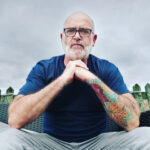 Name: Paul Stevenson
Name: Paul Stevenson